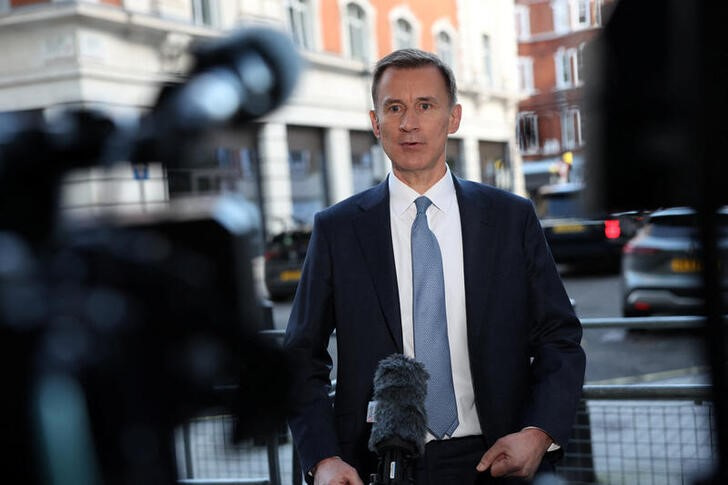By William Schomberg
LONDON (Reuters) -Britain borrowed less than predicted by its budget forecasters in the first seven months of the financial year, data showed a day before finance minister Jeremy Hunt is expected to announce some pre-election tax cuts.
Government borrowing between April and October totalled 98.3 billion pounds ($122.49 billion), the Office for National Statistics (ONS) said on Tuesday, about 22 billion pounds higher than in the same period last year but nearly 17 billion pounds less than the Office for Budget Responsibility (OBR) forecast.
Alison Ring, a director at ICAEW, an accountancy trade group, said Hunt had some headroom to cut taxes or increase spending in his Autumn Statement on Wednesday.
"But in reality, there is no headroom when the public finances continue to be on an unsustainable path without a long-term fiscal strategy to fix them," Ring said.
Prime Minister Rishi Sunak - who is expected to call an election next year - said on Monday that his attention was turning to tax cuts to help the stagnant economy after a slowing in Britain's high inflation rate.
But Sunak promised there would be no repeat of last year's promises of huge tax cuts that sent the bond market into a meltdown and cost Liz Truss her job as prime minister.
Moreover, the OBR is expected to lower its economic growth outlook on Wednesday, making it harder for the government to meet its target of bringing debt down as a share of gross domestic in the last year of a five-year forecast period.
"The short-term improvement in the fiscal position this year will likely prove unsustainable over the next five years," Michal Stelmach, senior economist at KPMG UK, said, pointing to the cost of higher interest rates.
Hunt promised to remain responsible with the public finances.
"At my Autumn Statement tomorrow, I will focus on how we boost business investment and get people back into work to deliver the growth our country needs," he said after the data.
Hunt is also reported to be considering a range of options for easing the tax burden on voters who are siding mostly with the opposition Labour Party, according to opinion polls.
In the longer term, many analysts say tax rises, not cuts, are needed to meet the challenges of an ageing population, higher debt costs and slow economic growth.
"Squaring that fiscal circle appears set to be left to whoever forms the next government," Martin Beck, chief economic advisor to the EY ITEM Club, a forecasting group, said.
MAJOR SHOCKS
Britain's public finances - like those of many economies - were hit hard by huge government spending to offset the shocks of the COVID pandemic and last year's surge in energy prices.
Public debt now stands at more than 2.6 trillion pounds, almost 98% of GDP, more than three times its size 20 years ago.
In October alone, public sector net borrowing excluding state-owned banks was 14.9 billion pounds, almost 3 billion pounds more than expected by economists polled by Reuters.
The figure was also higher than the OBR's forecast for borrowing of 13.7 billion pounds.
Revenue in the April-October period was up by 4.5% despite a largely flat-lining economy, reflecting in part the impact of inflation and strong wage growth on tax income.
Spending was up by 4.8% with net social benefits, mostly welfare spending, up nearly 14%.
Sunak said on Monday he wanted to change the benefits system for working-age adults, saying it was "a national scandal" that around 2 million people of working age were not in work.

The ONS figures showed debt interest costs fell by almost 20% in the April-to-October period, helped by lower inflation.
($1 = 0.8025 pounds)
